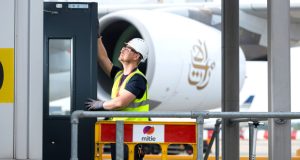Q: What was you first job in the FM sector?
Actually, how do you define FM? I’ve been running services businesses since I was 24. Initially that was oil engineering services and then I moved across to what people would traditionally think of as an FM business. That was 20-years ago.
Q: What made you choose FM as a career?
To be honest, I didn’t choose it – I wanted to be an RAF pilot! But having found FM, I’ve stayed because I’m passionate about EMCOR UK. We work with exciting and challenging sectors from military to nuclear and water industries. I particularly enjoy the variety that involves.
Q: How did you progress through the profession to your current role?
I’d held a range of management posts of varying scale and complexity during my career before progressing into my current leadership role. When I first arrived at EMCOR UK 15 years ago I was responsible for a large portfolio of services. Our business has grown more than tenfold since then, so it’s been a significant growth journey.
Q: Do you have any qualifications or training in FM and related areas such as health and safety? And how have you benefited from them?
I don’t have any specific FM qualifications, I’ve undergone various development programmes via the Institute of Directors and completed IOSH which deepened my understanding. I’ve since completed executive training in leadership and strategy with Ashford University.
Q: What is your greatest contribution to the FM sector, or your current role?
Without doubt it has been my collaboration journey. It all started with a desire to build on one relationship with one customer and through that I discovered the Institute of Collaborative Working (ICW). Today we have an embedded collaboration culture at EMCOR UK, and we’ve trained 300 of our people in collaboration skills and behaviours with Cranfield School of Management. I’m also proud to have been at the forefront of the pioneering new ISO standard in the FM industry and continue to support the development of ICW as a non-executive director. For me, it’s been all about making change happen, rather than simply talking about it.
Q: What’s changed most since you started in FM?
I think there is a danger that FM is becoming too commoditised. We need to balance sustainable and profitable long-term relationships and open up new avenues for customers that go beyond traditional thinking. At EMCOR UK, a big part of our journey involves improving the workplace experience, which in turn improves staff retention and productivity for our customers.
Q: What personal qualities do you think are most needed for a successful career in FM?
Top of the list is the ability to really connect with others. These are the people that go out of their way to make our customers’ lives better by listening and understanding, then doing. This industry needs people with good listening skills, empathy and the ability to manage their own emotions as they are more able to generate fulfilling long-term relationships. We call this emotional consciousness.
Q: If you could do one thing differently in your career in FM, what would it be?
I wish I’d done executive leadership training earlier in my career. It completely changed my attitude to work and to business relationships.
Q: What would make the biggest difference to the FM sector? And how could that be achieved?
The ability to recognise and build genuine win; win relationships – which is achieved through collaboration. In addition to that, I also think workplace environment has moved higher up our customers’ agendas – and FM needs to respond with exciting and productive places to work. More and more companies are interested in how the built environment supports the wellbeing of people occupying it and I believe that is going to remain a priority.
Q: What advice would you give to young people coming into the profession now?
I’d recommend spending time gaining a deeper understanding of what is possible. The sector offers so many opportunities – particularly now, as it embraces technology, innovation and big data. And the exposure to multiple customer sectors makes it both attractive and interesting. I think as sector we need to be proactive about engaging with the next generation too, which is why I set up and now lead the Creating Balance initiative at EMCOR UK. Our goal is to respond to our diversity and inclusivity challenges and do our part to resolve the gender imbalance in FM. We should be working hard to attract talented young people into this industry, especially offering opportunities to develop female talent and promote roles that utilise STEM subjects. FM is not simply about security guards and engineers, we are creating great places for people to work and for that we need a broad variety of skills. Vocational skills are hugely important, especially at a time when apprenticeship and degree routes into the workplace are less prescriptive. Now you can do either and succeed.
Q: What are your long-term goals for the next seven to ten years?
I’m keen to continue to build my career profile in this sector and to see FM – and business in general – achieving better levels of gender balance. I want to see more female talent at the top of our business, not only because it’s the right course of action for our business and morally, but also because I have two daughters which makes it personal. Why not have a diverse business – and maximise on the full range of experiences, knowledge and skill sets?
Q: What do you predict could be the main changes to the FM sector over the next few years?
Two things spring to mind. Firstly, the continued use of technology and data to drive innovation, efficiency and stakeholder experience. And secondly, how we create workspaces with all the features the next generation workforce needs. I’m excited about creating sustainable workspaces that attract, retain and develop talent. Soon there will be no such thing as a ‘traditional’ workplace as more and more organisations adopt dynamic and engaging work patterns.
Q: What are the greatest challenges of working in FM?
Trying to strike the balance between risk and reward and avoid a race to the bottom is the biggest challenge of the moment in my opinion. It’s still difficult, but not impossible, to find customers who recognise that price isn’t the only way to unlock future value.
Q: What do you enjoy most about working in FM?
The combination of exposure to such a variety of sectors, and the chance to work with fascinating clients doing amazing things keeps me interested and challenged. I also take pleasure in leading a people-oriented organisation that creates opportunities for individuals to progress. Seeing colleagues develop into more senior roles and then blossom and flourish is hugely rewarding.




